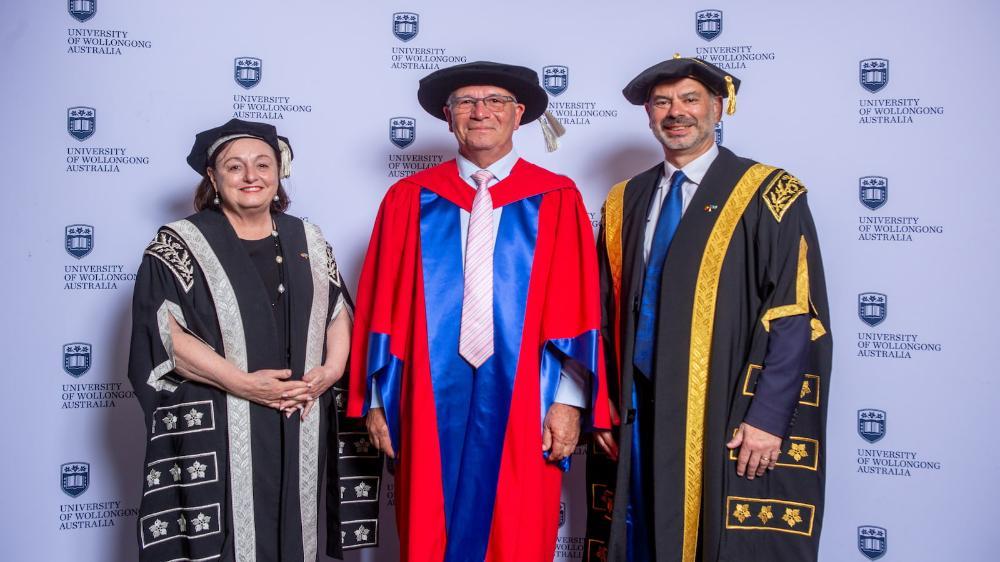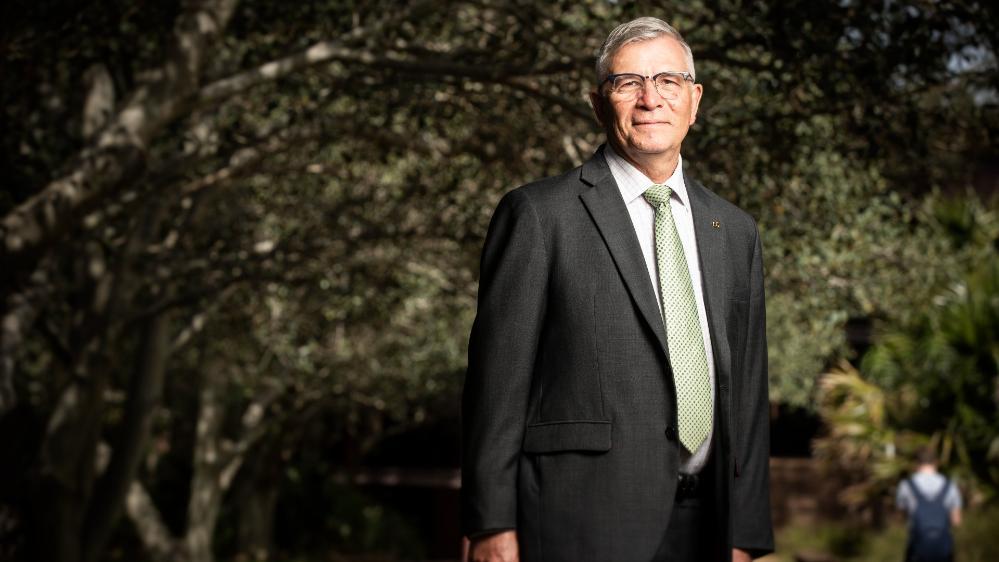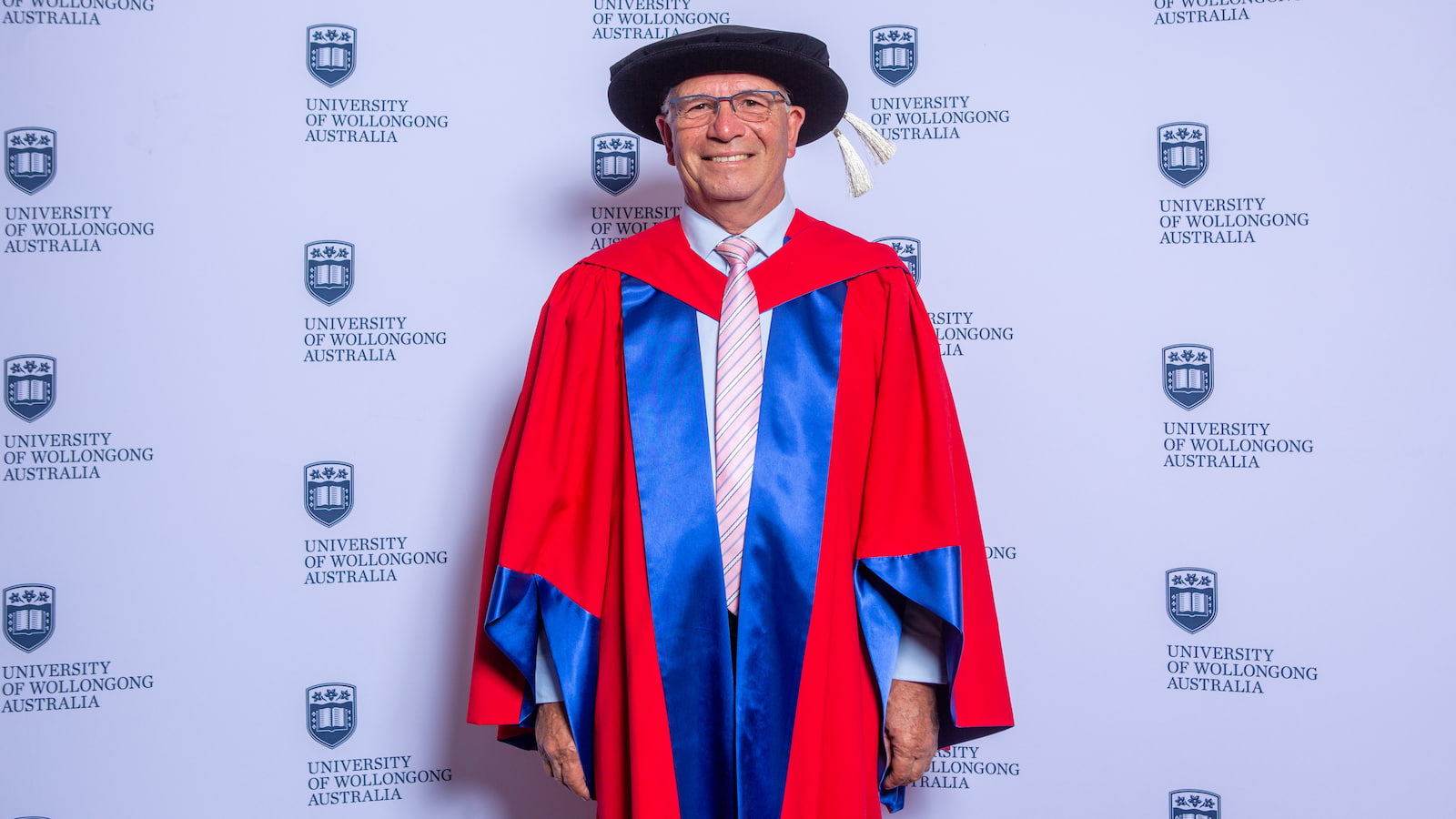November 1, 2023
Dual honours for former Deputy Vice-Chancellor Professor Joe Chicharo
Long-serving UOW executive recognised with Honorary Doctorate and Emeritus Professorship
Emeritus Professor Joe Chicharo OM is passionate about the transformative power of education. It is not hyperbole; it is a story he has lived since arriving in Australia in 1970 from his native Portugal. He was 13 then, a teenager in a bright and unfamiliar new world.
More than five decades later, Professor Chicharo’s immense educational legacy and contribution to the University of Wollongong (UOW) and, more broadly to the city that became his home, was today (Wednesday 1 November) acknowledged with the dual honour of a Doctor of Science, honoris causa, and an Emeritus Professorship.
Professor Chicharo, who retired from his role as Senior Deputy Vice-Chancellor at UOW in 2021, also delivered the occasional address to the graduation ceremony for the Faculty of Engineering and Information Sciences.
“I come from humble beginnings. I was the first in family to go to university, although I am happy to say that others have since followed. In essence, it is my innate love of learning, teaching and research that has motivated my sense of purpose,” he said.
“Higher education is about making a transformative impact on people and our society. I have always believed that. As an academic, you have a unique and privileged opportunity to make a difference. It is not about you, but the greater good and, more importantly, about the students.”
Emeritus Professorships are awarded to academics who have demonstrated outstanding achievements, exceptional service, and significant contributions to the University.

Vice-Chancellor Professor Patricia M Davidson, Professor Joe Chicharo, and Deputy Chancellor Robert Ryan.
When he arrived in Wollongong at just 13, Professor Chicharo could not speak English. His education too, lagged behind his age.
“I had to go into a transition class to learn English,” Professor Chicharo said. “Schools were set up to accommodate migrants in those days. I also had gaps in my education, as I had only completed fourth class before arriving and after a year in the transition class I went straight into year 8 at the bottom of all subjects.”
That class was at Port Kembla High School, which, Professor Chicharo recalled, “had a huge migrant population in those days”. The nearby Warrawong High School, where Professor Chicharo would finish his secondary schooling, was under construction.
While the shift to Australia, and to a new education system, was at times overwhelming, Professor Chicharo immediately fell in love with the lifestyle of his new home.
“It was a quiet place compared to today; it was sleepy,” he said. “Life wasn’t as hectic. I remember long holidays and walking to the beach from Lake Heights. It was a good lifestyle and a nice environment, although the food took a bit of getting used to.”
Professor Chicharo relished the opportunity to learn, and within a few years, he was excelling at physics, chemistry, and mathematics. All of which provided him with the ideal foundation to pursue a career in engineering.
“I did my HSC at Warrawong High School and I applied for a number of cadetships. I ended up with an electrical engineering cadetship at John Lysaght (within the steel sector). I was working part time and coming to the University of Wollongong at night for classes. We were learning the theory at university and putting it into practice in our day job.
“Electrical engineering captured my imagination, a fast-moving discipline driven by lots of discoveries and innovation. I was drawn to that.”
After completing his cadetship, Professor Chicharo was appointed by the University some three years later as a lecturer. From there, his career progressed quickly. He fell in love with teaching, and within a few years, completed his PhD. The balance of teaching, research, and engaging with industry was the ideal combination to challenge Professor Chicharo.

Professor Joe Chicharo at the time of his retirement in 2020. Photo: Paul Jones
It was in research, too, that Professor Chicharo excelled, attracting millions in funding over the years. In 1998, as the world was on the cusp of the dot com boom, he was appointed as Managing Director of the Institute for Telecommunications and IT Research, followed by Research Director of the CRC for Smart Internet Technology a few years later. He also served as Head of the School of Electrical, Computer and Telecommunications Engineering (2002-2003), and Dean of the Faculty of Informatics (2003-2007).
With more than 250 research papers in prestigious journals and conferences to his name, Professor Chicharo secured millions of dollars of research funding throughout his career.
For nearly 15 years, Professor Chicharo relished his role in UOW’s senior executive team. From Pro Vice-Chancellor (International) in 2008 to 2010, to Deputy Vice-Chancellor across the International, Global Strategy, and Academic portfolios, and finally Senior Deputy Vice-Chancellor, Professor Chicharo had a significant overview of virtually all facets of the University.
In 2007, Professor Chicharo was awarded an Order of Merit from the President of the Portugal Republic. This award is intended to reward meritorious acts or services, in the exercise of public or private functions, which reveal self-sacrifice in favour of the community.
UOW has been such an intrinsic part of Professor Chicharo’s life. It is where he spent most of his career, where he gained all his qualifications, and where his three sons also received their education.
He is overjoyed to have received both an Emeritus Professor and an Honorary Doctorate from the University to which he devoted so much of his life.
“I was absolutely delighted when I found out about the awards. It is simply wonderful,” he said.
“I was hoping to receive an Emeritus Professorship award at some point, but the Honorary Doctorate just made my day, I felt so humbled by it. It is such a great honour and privilege to be recognised in this way.”
In his address to the graduates, Professor Chicharo implored them to have full confidence in the knowledge and skills they acquired during their time at UOW.
“Back your ability to be highly successful professionals. You have not only received a world-class education at UOW, but more importantly, you have also mastered the art of being independent problem solvers with an ability to be creative and resourceful. You know to adapt and manage change.
“These skills and more are extremely important to enable our graduates to positively contribute to our society, and thus create a better world.”
While Professor Chicharo is happy to look back on his career, and has kept professionally active as a Member of the Higher Education Standards Panel, he is enjoying the freedom of retirement and the chance to spend more time with his family and friends.
“I have been having a lot of fun. I have already ticked off a couple of things on the bucket list, including doing the Camino de Santiago pilgrimage in Spain with my wife. The only challenge is that I am adding many more things to the bucket list than I am ticking off!
“A major highlight was that I became a grandfather for the first time this year.”
With countless achievements and highlights to his name, Professor Chicharo said his career was built on a foundation of purpose and passion for education. And this is the secret to his success.
“There has never been a dull moment, it has always been exciting. I have been driven by an ambition to achieve greater things for the institution, its staff, and students.”
